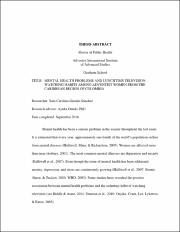Mental health problems and lunchtime television-watching habits among Adventist women from the Caribbean region of Colombia
Abstract
Mental health has been a serious problem in the society throughout the last years.
It is estimated that every year, approximately one fourth of the world’s population suffers
from mental diseases (Halliwell, Main, & Richardson, 2007). Women are affected more
than men (Astbury, 2001). The most common mental illnesses are depression and anxiety
(Halliwell et al., 2007). Even though the issue of mental health has been addressed,
anxiety, depression, and stress are continuously growing (Halliwell et al., 2007; Storrie,
Ahern, & Tuckett, 2010; WHO, 2003). Some studies have revealed the positive
association between mental health problems and the sedentary habit of watching
television (see Biddle & Asare, 2011; Dunstan et al., 2010; Onyike, Crum, Lee, Lyketsos,
& Eaton, 2003).
The purpose of this quantitative study is to identify the differences between the
four categories of television-watching habits during lunchtime—(a) watching news
programs on television, (b) watching non-news programs on television, (c) watching
either news or other programs on television, and (d) not watching television—in regard to
the participants’ mental health statuses in terms of depression, anxiety, and stress. In
addition, this study aims to find the relationship between the mental health statuses and
television-watching practices during lunchtime of Adventist women from the Caribbean
Region of Colombia.
This research study found that those participants who watched television during
lunchtime had higher scores of depression, anxiety, and stress than those who did not
watch. However, there was not a significant difference in the scores of anxiety and stress
between the three categories of types of television programs. On the other hand, it was
found a significant difference in the scores of depression between the three types of
television programs; however, the post-hoc test did not show between which categories
of types of television-watching practices there was a difference in the scores of
depression.
It is recommended to conduct an experimental study in order to establish a causal
relationship between watching television during lunchtime and the presence of a mental
health problem, determining which are independent and dependent variables.
Additionally, it is recommended that broadcasting networks and public health institutions
work together in order to transmit through television tools aimed to overcome mental
health problems in the time slot for lunchtime because many people that have mental
health problems are televiewers at this time.
Collections
Related items
Showing items related by title, author, creator and subject.
-
The Role of women in Johannine literature : an exegetical study
Ekwenye, John (Adventist International Institute of Advanced Studies, 2014-01)The role of women in Johannine literature appears to be unique in a number of ways. Firstly, in the Gospel of John, there is a different presentation accorded to women in comparison to the Synoptics. John gives a lengthy ... -
The Lived experiences of Filipino women with breast cancer
Almocera, Dianne Pearl (Adventist International Institute of Advanced Studies, 2020-03)In 2015, breast cancer ranked third among the leading new cancer deaths and had the highest incidence among cancer cases in the Philippines (International Agency for Research in Cancer [IARC], 2017; Laudico et al., 2015). ... -
Breaking the glass ceiling : a phenomenological study of women leaders in Adventist higher education institutions
Joseph, Nadine Anna (Adventist International Institute of Advanced Studies, 2014-07)The Adventist Church owns and operates 106 higher education institutions worldwide, and opened its first higher education institution in 1874. To date, less than 20 women have served in the capacity of president, even ...


